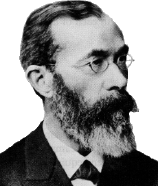August 16: Wilhelm Wundt
Wilhelm Max Wundt (1832)
It was on this date, August 16, 1832, that German psychologist Wilhelm Max Wundt was born. He studied at Tübingen University from 1851 and took his MD at the University of Heidelberg in 1856 (the year Sigmund Freud was born). He began as a professor of physiology, but from 1875-1917, Wundt was Professor of Inductive Philosophy at Leipzig University. His solid background in physiology prepared him to propose that human behavior arises from human physiology and ethics rather than from some mystical concept of mind.
In the mid- to late-nineteenth century, a forensic psychiatrist was known as an "alienist," and the study of mind and behavior was more closely aligned with philosophy than with empirical science. The pre-Freudian Wundt established the world's first experimental laboratory in psychology, the Institute for Experimental Psychology, in 1879, ridding psychology of its medieval notions of metaphysics and raising it to the level of a true science. Wundt is often referred to as the "Father of Experimental Psychology" and the "Founder of Modern Psychology." He was one of the founders of Folk Psychology and was probably the greatest psychologist of his time. Wundt's Institute was the forerunner of the psychological laboratories of our time. His 1874 Principles of Physiological Psychology (Engl. trans., 1904) revolutionized the science.
A summary of his work, published by the University of Indiana, explains:
Wundt's revolutionary approach to psychological experimentation moved psychological study from the domain of philosophy and the natural sciences and began to utilize physiological experimental techniques in the laboratory. To Wundt, the essence of all total adjustments of the organism was a psychophysical process, an organic response mediated by both the physiological and the psychological. He pioneered the concept of stating mental events in relation to objectively knowable and measurable stimuli and reactions. Wundt perceived psychology as part of an elaborate philosophy where mind is seen as an activity, not a substance. The basic mental activity was designated by Wundt as apperception.*
Wundt employed a method of introspection in his science that after the early 1920s was rejected as a tool of psychological experimentation. Instead, in showing that psychology could be a valid experimental science, he made his greatest contribution. This he did, along with publishing about 53,000 pages on his studies, despite poor eyesight — quite an achievement in those pre-Braille days!
Wundt's counterpart in the US was William James, and James shared Wundt's idea of divorcing psychology from superstition. Like James, Wilhelm Wundt was a freethinker in religion, though both believed in God. Wundt would not accept metaphysics and mysticism in psychology and instead brought to it an evolutionist and ethical perspective. He rejected any belief in personal immortality and accepted God only as "a divine world-power," or little more than a symbol of the unity of the universe. In his 1889 System der Philosophie, Wundt rejects Christianity as a cluster of superstitions.
* Dr. Jonathan Plucker "History of Influences in the Development of Intelligence Theory and Testing," University of Indiana.
Originally published August 2003 by Ronald Bruce Meyer.


